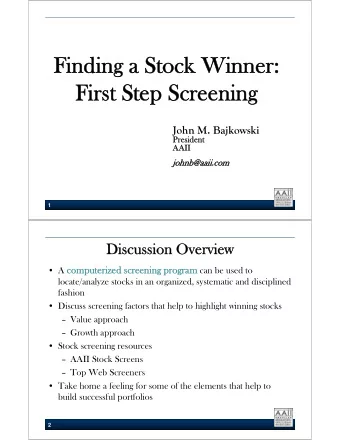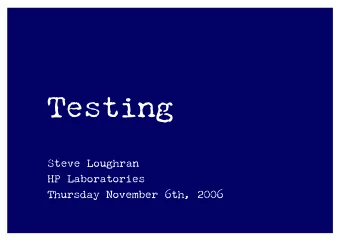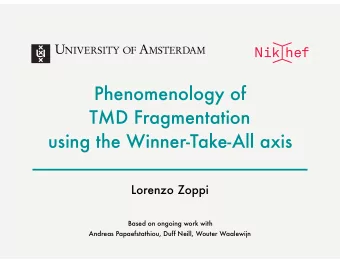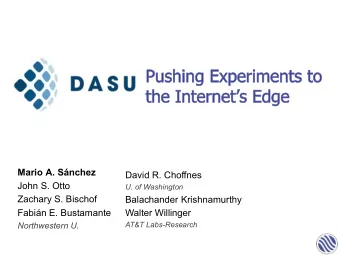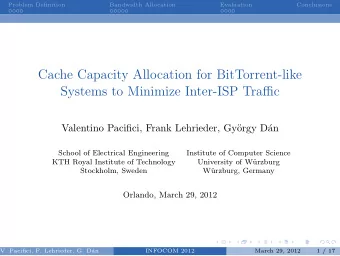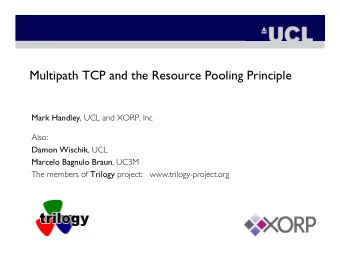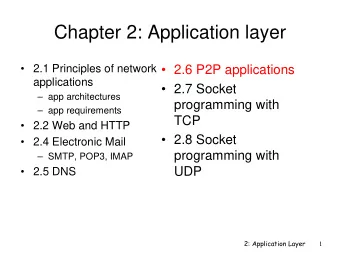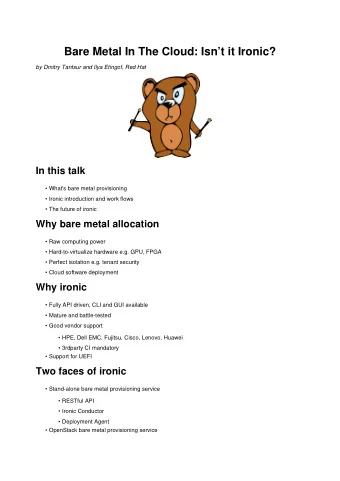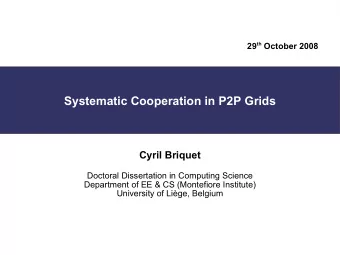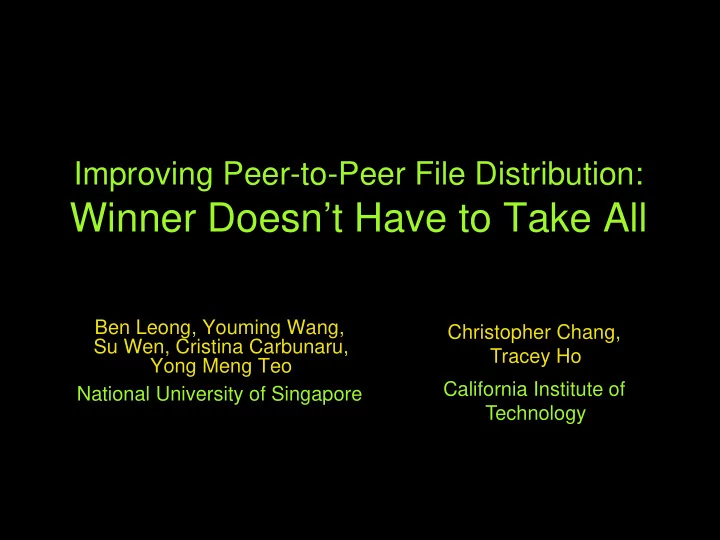
Winner Doesnt Have to Take All Ben Leong, Youming Wang, Christopher - PowerPoint PPT Presentation
Improving Peer-to-Peer File Distribution: Winner Doesnt Have to Take All Ben Leong, Youming Wang, Christopher Chang, Su Wen, Cristina Carbunaru, Tracey Ho Yong Meng Teo California Institute of National University of Singapore Technology
Improving Peer-to-Peer File Distribution: Winner Doesn’t Have to Take All Ben Leong, Youming Wang, Christopher Chang, Su Wen, Cristina Carbunaru, Tracey Ho Yong Meng Teo California Institute of National University of Singapore Technology
P2P File Distribution
File Distribution != P2P File Sharing A set of clients download the file from server: – Typically minimize Max. or Average Download Time with some minimal QoS. – Nodes may leave when done
File Distribution Examples 1. Facebook/Twitter needs to update/synchronize the data on thousands of servers. Use BitTorrent 2. Microsoft issues server pack update to thousands of clients. Use Servers
BitTorrent 1. Data Choke/Unchoke Mechanism
BitTorrent 2. Unchoke Choke/Unchoke Mechanism
BitTorrent 3. Request Choke/Unchoke Mechanism
BitTorrent Winner Winner Winner Winner 4. Data Loser Loser Auction! Choke/Unchoke Mechanism Winner(s) Takes All [Levin et al., SIGCOMM’08]
Is there a another way?
Is there a another way? 1. Trade? want [0-4] want [5-9] has [5-9] has [0-4], not [5-9]
Is there a another way? 2. Accept gimme [5-9] gimme [10-14] has [0-4], not [5-9]
Is there a another way? 3. Data [0-4] [5-9] [10-14] [5-9] Block-for-block
Is there a another way? Forward Contract 3. Data Promise Tit-For-Tat Transport Protocol (TFTTP)
Evaluation Result on EC2 Algorithm Download Time (s) Throughput (kB/s) BitTorrent 2062 53 TFTTP 1571 70 100MB file, Server 300 kB/s. 24 Clients (8 nodes in each group): 50 kB/s, 100 kB/s, and 150 kB/s Details in paper
Why? Some intuitions
Two Observations 1. Availability – find blocks to download 2. Pipelining – fully utilize the upload bandwidth
1. Nodes can trade blocks they don’t already possess, but will soon
Availability
Availability
Significant Clustering in BitTorrent [Legout et all, SIGMETRICS’07] Not so for TFTTP Details in paper
2. Not inherently bad for fast peers to trade with slower peers
Intuition Upload bandwidth is the key limiting factor ⇒ Nodes should maximize use of upload bandwidth
Simple Queuing Model λ 1 b 1 p 1 λ 2 b 2 p 2 λ 3 b 3 p 3 b 4 p k λ k b 1 = b 2 = b 3 = …= b k λ 2 λ k λ 1 λ 3
Promises are Self-Clocking trade?
Promises are Self-Clocking accept
Promises are Self-Clocking data data
Promises are Self-Clocking done! data
Promises are Self-Clocking trade? New trades proposed only when an existing trade is completed.
Promises are Self-Clocking trade? Promises allow “multiplexing” of data transfers over time
Promises removes uncertainly associated with choke/unchoke – allows better pipelining
Future Work • Open system • Altruism • Smarter server • Multiple geographically distributed servers
For file distribution …..
Maybe … BitTorrent isn’t quite the right answer
QUESTIONS
How often do nodes lose? From Bid to slow Bid to Bid to fast Bid to all nodes medium nodes nodes nodes Slow 20.75% 61.64% 77.22% 45.68% (281/1355) (586/950) (456/590) (1323/2896) Medium 29.08% 26.59% 33.46% 29.71% (197/677) (319/1200) (373/1113) (888/2990) Fast 27.09% 19.72% 14.28% 18.58% (128/472) (232/1177) (178/1246) (538/2895) 100 MB file for 3 groups of peers (64KB/s, 128KB/s, 196KB/s) before the first node is done
But it’s not too bad… From To Slow To Medium To Fast To All Slow 138.42 79.21 56.01 273.64 Medium 88.23 217.83 240.71 546.76 Fast 73.25 273.7 412.42 759.37 Server 17.24 36.82 70.36 124.42 All 317.14 607.56 779.49 1704.19 Data transferred in MB until first node is done.
Recommend
More recommend
Explore More Topics
Stay informed with curated content and fresh updates.






